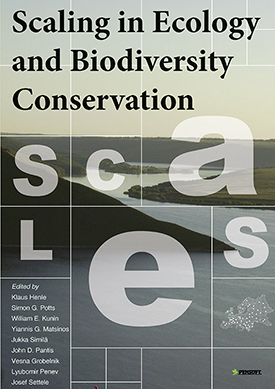Press release, 06th August 2014
Scaling in ecology and biodiversity conservation explained in a book and an online tool
Leipzig. The EU project SCALES has come to an end in July 2014 resulting in a first of its kind description of challenges that arise in protecting biodiversity across different scales. Results from the project are comprised in a book and an online tool developed to provide a comprehensible explanation of the importance and use of scaling in ecology and biodiversity conservation. The book was published via the open access Advanced Books platform.
The 5-year EU project project Securing the Conservation of biodiversity across Administrative Levels and spatial, temporal, and Ecological Scales (SCALES) has come to an end in July 2014 resulting in a
first of its kind description of challenges that arise in protecting biodiversity across different scales.
A wide range of practical methods and recommendations to improve conservation at regional, national and supranational scales are included in a book published as a synthesis of project outcome.
The book “Scaling in Ecology and Biodiversity Conservation” was published in open access via Pensoft Publisher’s Advanced Books platform. Results are also presented in an easy to use interactive
SCALETOOL, specifically developed for the needs of policy and decision-makers. The tool also provides access to a range of biodiversity data and driver maps compiled or created in the project.
Human actions, motivated by social and economic driving forces, generate various pressures on biodiversity, such as habitat loss and fragmentation, climate change, land use related disturbance patterns, or species invasions that have an impact on biodiversity.
Each of these factors acts at characteristic scales, and the scales of social and economic demands, of environmental pressures, of biodiversity impacts, of scientific analysis, and of governmental responses do not necessarily match. However, management of the living world will be effective only if we understand how problems and solutions change with scale.
The book is the first of its kind that provides a broad overview of challenges that arise in studying and conserving biodiversity across scales. Everyone concerned with the conservation of biodiversity will find ideas in this book to help in the urgent task of protecting biodiversity, through study or action, at all kinds of scales: spatial, temporal, administrative, and ecological”, says prof. Klaus Henle of the Helmholtz Centre for Environmental Research (UFZ).
The book aims to bundle the main results of SCALES in a comprehensive manner and present it in a way that is usable not only for scientists but also for people making decisions in administration, management, policy or even business and NGOs; to people who are more interested in the “practical” side of this issue.
Guidelines, practical solutions and special tools are also presented as a special web based portal, SCALETOOL, which puts together scientific outcomes widely spread over the scientific literature.
Outcomes and products of the project are a result from 5-year collaboration between 31 institutions across Europe, Taiwan, and Australia. The book “Scaling in Ecology and Biodiversity Conservation” is authored by Klaus Henle and Josef Settele, Helmholtz Centre for Environmental Research - UFZ; Simon Potts, University of Reading; William Kunin, University of Leeds; Yiannis G. Matsinos, University of the Aegean; Jukka Simila, University of Lapland; John Pantis, Aristotle University of Thessaloniki; Vesna Grobelnik, Centre for Cartography of Fauna and Flora, Slovenia; Lyubomir Penev, Bulgarian Academy of Sciences and Pensoft Publishers.
Publication
Henle K, Potts S, Kunin W, Matsinos Y, Simila J, Pantis J, Grobelnik V, Penev L, Settele J (2014) Scaling in Ecology and Biodiversity Conservation. Advanced Books: e1169. doi: 10.3897/ab.e1169
http://dx.doi.org/10.3897/ab.e1169
http://ab.pensoft.net/articles.php?id=1169
The book is published within the FP7 project SCALES “Securing the Conservation of biodiversity across Administrative Levels and spatial, temporal, and Ecological Scales”, Grant N° 226852,
http://www.scales-project.net
For further information please contact:
Prof. Dr. Klaus Henle
Department of Conservation Biology at the Helmholtz Centre for Environmental Research (UFZ)
phone: +49 (0)341 235 1270
Prof Dr Klaus Henle
Press contact
Helmholtz Centre for Environmental Research
Tilo Arnhold, Susanne Hufe
Tel +49-(0)341-235-1635, -1630
Additional links
EU project project Securing the Conservation of biodiversity across Administrative Levels and spatial, temporal, and Ecological Scales (SCALES):
http://www.scales-project.net/
interactive SCALETOOL:
http://scales.ckff.si/scaletool/
In the Helmholtz Centre for Environmental Research (UFZ), scientists conduct research into the causes and consequences of far-reaching environmental changes. Their areas of study cover water resources, biodiversity, the consequences of climate change and possible adaptation strategies, environmental technologies and biotechnologies, bio-energy, the effects of chemicals in the environment and the way they influence health, modelling and social-scientific issues. Its guiding principle: Our research contributes to the sustainable use of natural resources and helps to provide long-term protection for these vital assets in the face of global change. The UFZ employs more than 1,100 staff at its sites in Leipzig, Halle and Magdeburg. It is funded by the federal government, Saxony and Saxony-Anhalt.
The Helmholtz Association contributes to finding solutions for large and pressing issues in society, science and the economy through excellence in the following six areas of research: energy, earth and the environment, health, key technologies, structure of matter, transport and aerospace. With almost 36,000 employees and coworkers in 18 research centres and an annual budget of approx. 3.8 billion Euros the Helmholtz Association is the largest scientific organization in Germany. Work is conducted in the tradition of the renowned natural scientist Hermann von Helmholtz (1821-1894).

